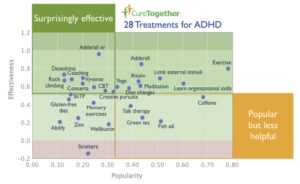
By Alexandra Carmichael, Co-Founder of CureTogether
Although Attention-Defincit Hyperactivity Disorder (ADHD) has only been recognized as a disease in the last 20 years, patients already are well-versed in what treatments work for them, accoring to a new study by CureTogether, a free resource owned by 23andMe that allows people to share information about their health and treatments.
People in the study said they found that lifestyle changes like exercising, meditation, and limiting external stimuli were effective treatments, as were the drugs Adderall and Ritalin. Conversely some drugs like Strattera, Wellbutrin, and Abilify were among the least effective, according to the study. These are all treatments suggested and reported by patients, so some redundancy in the terms used is to be expected. In addition, the term “treatment” in this study refers to anything patients describe using to help them feel better whether it is an officially prescribed medical treatment or not.
More than five million Americans have been diagnosed with ADHD, and often appears to run in families. Finding treatments that work well can be a challenge, so CureTogether asked people suffering from ADHD to rate the effectiveness of different treatments.
Most Effective Rated Treatments for People with ADHD
1. Adderall xr
2. Adderall
3. Exercise
4. Dexedrine
5. Vyvanse
6. Limit external stimuli
7. Coaching
8. Rock climbing
9. Ritalin
10. Learn organizational skills
CureTogether’s study compiled responses from 852 people with Attention-Deficit Hyperactivity Disorder, who rated the effectiveness of 28 different treatments.
Where did this data come from? This is the result of a four-year CureTogether study on Attention-Deficit Hyperactivity Disorder, in which people living with the condition shared information about their symptoms and what treatments worked best for them. We’d like to thank those who participated. And just as they shared their experience with treatments, we’re freely and openly sharing the results of the ADHD study.
This is part of a regular series of CureTogether research findings. CureTogether’s research findings are different than those made by 23andMe, which look at genetic associations with illness, traits and drug response. But as we continue our work with the CureTogether community, 23andMe hopes to incorporate more of this kind of self-reported information into our own research. CureTogether present its findings just as they are – patient-reported data – to stimulate discussion and generate new insights for further research.
Please tweet, blog, or pass this along to anyone who can benefit or is interested in ADHD. Thank you!



